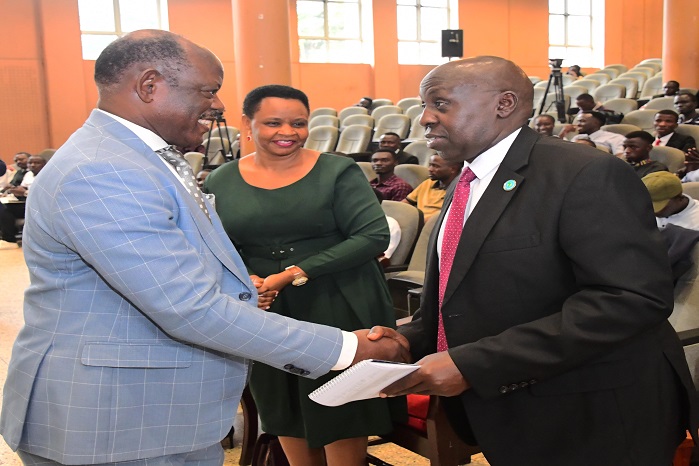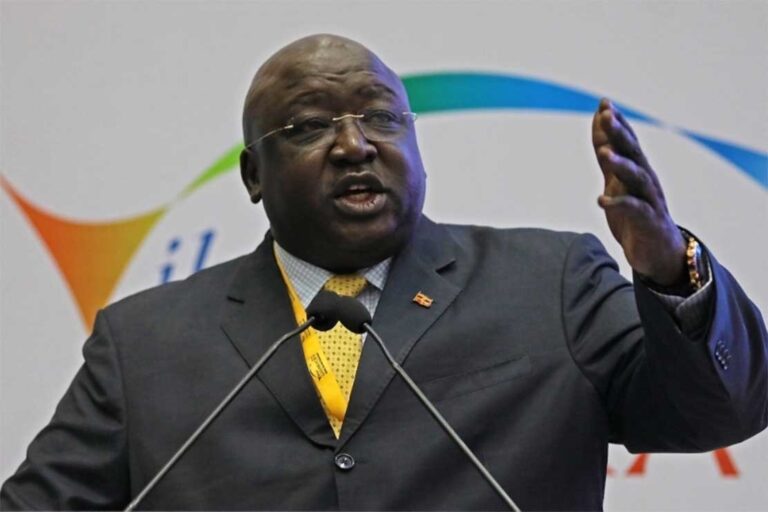
Students dialogue on corruption
HABARI DAILY I Kampala, Uganda I Ugandan youth have been urged to refrain from engaging in corruption practices, which would lead them into stealing.
Speaking during the launch of the National Students Participation in the Fight Against Corruption program, at Makerere University, in Kampala, Brig. Gen. Henry Isoke, the head of the State House Anti-Corruption Unit, urged Ugandan youths to take responsibility in fighting the pressing issue of corruption.
“You should reflect on their own contributions towards the fight against the vice, and refrain from stealing,” he told the attentive youth early this week.
He told them that as much as they blame the Government, they should deliberate on what they have done to ensure that corruption is fought.

The dialogue, organised under the Office of Makerere University Guild President, focused on youths and students’ perspectives on the cost of corruption in social and economic transformation.
It ran under the theme: “Universities Without Walls: Revolutionising University Institutions as the Engine for Transformational Sustainability.”
Gen. Isoke, who presided over the event, reminded the students that the Government has set up an institutional legal framework to fight corruption.
“If you question what the government has done, remember to also consider what institutional and legislative frameworks have been implemented,” he noted.
He urged the youths to be more analytical and independent rather than merely reactive activists.
“As intellectuals, you must study policy and not just run around with negativity. Be independent and analytical.”
He also stressed the importance of patriotism in achieving socio-economic transformation, explaining that this can only be achieved through Ugandans loving their country.
“Appreciate and get concerned about your country. Corruption is a concern for everyone.”

Gen. Isoke highlighted the challenges faced by anti-corruption efforts, noting the overwhelming number of complaints received.
“The Anti-Corruption Center receives between 150 to 200 complaints per day. Since its inception, we have handled 687,108 complaints. Out of these, 617 accused persons have been arraigned in court, including 310 civil servants.” he said.
He added that they have convicted 102 individuals, including 64 public officers and 58 private individuals.
Gen. Isoke further underscored the need for continued efforts and adherence to policy, saying that there is a lot of goodwill and complementary effort from the government.
“However, the solution lies in policy, mandate, and responsibility. Corruption starts with me and you.”
He also warned the youth against being manipulated by those with ulterior motives.
“Don’t accept to be used as pawns. There are issues you can resolve without violence. Be aware that some demonstrations are manipulated by individuals with their own agendas,” he urged.
Said Gen. Isoke: “As university students, it is crucial to engage in analytical thinking and avoid being unduly influenced by social media. Let’s reserve social media discussions for that platform and rely on substantial evidence and thorough research for academic discourse. We must uphold the intellectual standards that Makerere is renowned for.”
He hailed the Government for taking the insustrialisation path, adding that the country has achieved significant security improvements, with increased life expectancy and a growth in industries from 80 in 1980 to about 8,000 now.
Col. Edith Nakalema, emphasised the youth’s crucial role in rebranding the nation through collective efforts to combat corruption and unemployment.

She quoted George Bernard Shaw, one of the founders of the London School of Economics who once described poverty as “the greatest of evils and the worst of crimes.
She underscored the need for proactive engagement in national development.
Col. Nakalema also stressed the importance of unity among the youth to address unemployment and corruption, encouraging them to become co-creators of wealth and promoters of national prosperity.
She further praised President Museveni’s commitment to youth empowerment, noting recent appointments of young leaders to key ministerial positions.
These, she said included Lilian Aber, the Minister of State for Disaster Preparedness, Phiona Nyamutoro, Minister of State for Energy, Peter Ogwang the Minister of State for Sports, and Balaam Barugahara, the Minister of State for Youth and Children Affairs.
Prof. Barnabas Nawangwe, the Vice Chancellor of Makerere University, underscored the importance of intellectual debate in combating corruption, emphasising that the issue extends beyond mere office settings and starts with a mindset.
He highlighted Makerere University’s prestigious standing as a leading institution for black students globally.
“Makerere is not just a historically significant university but a beacon of innovation and excellence,” he stated.

He pointed out that the university’s achievements, such as being the first African institution to develop an electric car, underscore its global reputation.
Prof. Nawangwe urged students to leverage their intellectual capabilities to tackle the problem of corruption. He noted that corruption often begins with attitudes and practices rooted in everyday life and not merely in high offices.
“Corruption is a mindset issue,” he said, “and it can manifest in various forms, including nepotism and tribalism,” he said.
Reflecting on his own experiences, he lamented the shift from meritocracy to a landscape where corruption is prevalent in sectors such as healthcare and education.
Isaiah Masiga, a representative from Uganda’s Ministry of Gender, Labour, and Social Development, highlighted the crucial link between youth empowerment and the fight against corruption.
“We must focus on empowerment because we cannot effectively address corruption without empowering our youth,” Mr. Masiga stated.
He explained that the Ministry’s mandate is to enhance the potential of young people, a crucial aspect given the current situation in Uganda; with approximately 9.3 million youths in Uganda, nearly 41% are neither employed, in training, nor in education, translating to about 4 million unemployed young people.
“This stark reality underscores the need for targeted projects and initiatives to engage these youths and provide them with meaningful opportunities,” said Masiga.
“The Ministry of Gender is actively working to address this issue through various programs under its youth and children unit. Notably, the Youth Livelihood Program provides financial assistance to help young people start their own projects.”
GROW PROJECT HAILED
Additionally, he noted that the Uganda Women Entrepreneurship Program (UWEP) is designed to support women entrepreneurs with the knowledge and resources needed to launch income-generating ventures.

He also highlighted the Generating Growth Opportunities and Productivity for Women Enterprises (GROW) Project, a new government initiative aimed specifically at supporting women entrepreneurs.
“The GROW Project is designed to empower women with the skills and resources to start and sustain their own businesses,” he explained.
Masiga emphasised the need for integrity in all employment processes and urged that efforts to combat corruption must start with individual accountability.
“Corruption must end with you. Ensure that all processes, especially in employment, are transparent and regulated,” he asserted.
Vincent Lubega Nsamba, the Makerere University Guild President emphasised that corruption transcends legal boundaries, representing a complex moral, political, and economic issue that affects all aspects of life.
“Corruption is not merely an illegal activity; it is a profound moral and political problem with significant economic repercussions,” the Guild President stated.
He outlined how corruption fosters inequality, undermines the quality of healthcare, and hampers sustainable development.




